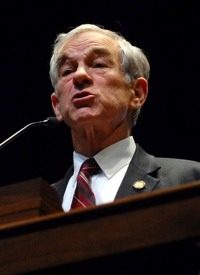
It’s official: Texas Congressman Ron Paul will be the Chairman of the House Subcommittee for Domestic Monetary Policy and Technology when the 112th Congress convenes in January. Rep. Spencer Bachus of Alabama, who is slated to be the Chairman of the House Financial Services Committee, of which the Monetary Policy Subcommittee is a part, announced Paul’s appointment as chairman of that subcommittee on December 9.
Paul himself had made an unofficial announcement of his appointment on the previous day’s Freedom Watch with Judge Andrew Napolitano on the Fox Business Network. Napolitano jested that “the blood pressure is going up as we speak over at the Federal Reserve” as a result of Paul’s appointment, which he termed “great news for those of us who want to find out what the Fed has really been doing.”
Indeed, a quick glance at the policies over which Chairman Paul will have jurisdiction, as listed in Bachus’s announcement, should gladden the heart of anyone who cares about sound money and the future of the U.S. economy. They include: “Domestic monetary policy, currency, precious metals, valuation of the dollar, economic stabilization, defense production, commodity prices, financial aid to commerce and industry.” The Fed, of course, has its crooked fingers in every one of these. Who better to have in a position to oversee them all, with the power to subpoena testimony from Fed Chairman Ben Bernanke, than the author of End the Fed?
This is the fourth time Paul has been up for the post but only the first time he has actually been appointed. On previous occasions the Republican leadership in the House employed various underhanded schemes to deny him the chair. What was different this time? In an interview with The New American Paul attributed it to several factors, including the passage of time; changes in the political environment; “current economic events”; and, perhaps especially, “the growing support of people outside of Washington at the grassroots level” who “have now learned more about the Fed,” want it to be audited, and recognize that House Republicans had supported his Audit the Fed bill. He pointed out also that “others in the Congress now are starting to talk about the Fed and why we should have more oversight.” “I think conditions have just changed,” he explained, “and so it looks like everything is falling into place now.”
Paul believes he has the support of the incoming House leadership, despite rumors to the contrary. Asked about a Bloomberg Businessweek report that Speaker-elect John Boehner would seek to “keep him on a tight leash,” Paul said, “I’d have to question that because, you know, Congressman Boehner in the past has said that part of his philosophy is that he would give committee chairmen a lot of independence.” He added that Bachus has said he will treat subcommittee chairman similarly, giving them “a lot of leeway.” Bachus has, in fact, been one of Paul’s biggest boosters in Congress. He appointed Paul to the post of ranking member of the subcommittee, a move he says he has never regretted, and cosponsored Paul’s Audit the Fed bill. Paul said that he will work “quietly and deliberately and orderly” so as not to “invite” confrontation with the leadership. “But,” he added, “if push comes to shove and they won’t [respond in kind], then we have to keep putting more and more pressure on them.”
Paul indicated that auditing the Fed, as well as auditing the U.S. gold reserves at Fort Knox, will be among his top priorities, though he was careful to point out that “nothing will happen overnight” because “we’ll have to start from scratch again in the new Congress.” One of his other priorities, he said, will be to educate the public on “the relationship of the Federal Reserve to the business cycle, and why we have inflation as well as recessions and depressions and unemployment” — problems that he believes, quite correctly, should be laid at the feet of the Fed and not the free market. In addition, he wants to discuss monetary reform “and why the dollar will not stand as the reserve currency of the world.” He very much fears a “dollar crisis” and believes that the rest of the world is beginning to fear the same thing, noting that even “the president of the World Bank has actually talked about the use of gold” in monetary reform — the sort of talk that has frequently resulted in Paul being labeled a “radical” or “gadfly” in the past.
Ron Paul’s turn at the top of the subcommittee heap has been a long time coming. For the sake of America’s future, let’s hope he is able to make the most of it. We may not get another chance to put our Fed-up financial system on a sound footing.
Photo of Ron Paul: AP Images


